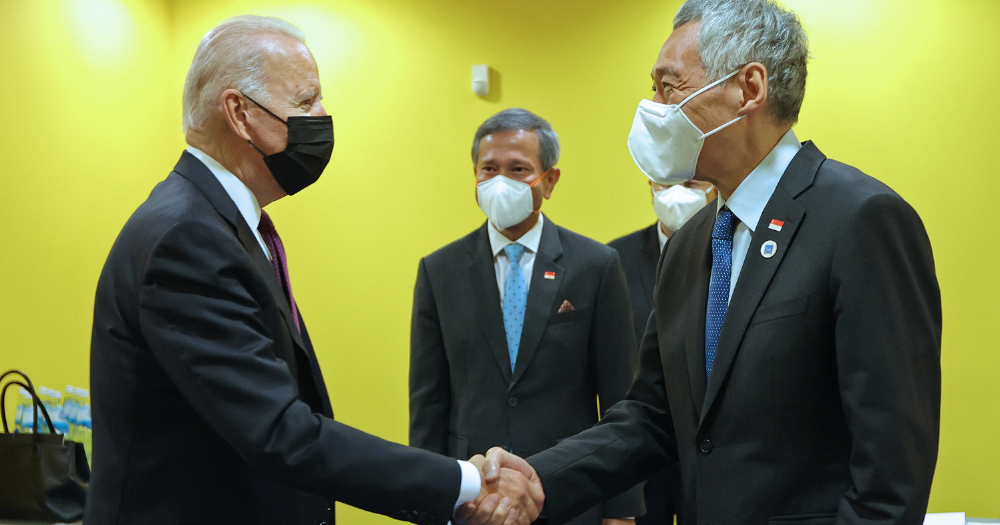Follow us on Telegram for the latest updates: https://t.me/mothershipsg
Prime Minister Lee Hsien Loong said that he foresees a "tougher competition" for Singapore with the adoption of a global minimum tax rate.
"I foresee there will be tougher competition for us. But we will take it in our stride," PM Lee said during a media wrap up session at the end of his official visit to Rome, Italy, on Oct. 31 for the G20 Summit.
During the summit, leaders of the G20 countries will endorse an OECD deal on a global minimum corporate tax of 15 per cent, Reuters reported.
According to the draft conclusion seen by Reuters, the new rule will come into effect globally from 2023.
This means that global corporations, including tech giants, will have to pay a minimum tax, and it will be harder for them to avoid paying tax by establishing their offices in low-tax areas.
How it impacts Singapore
PM Lee said that the tax rate was an effort by countries to come together to have a united front in improving the bargaining position against companies with very considerable pulling power.
Nonetheless, he opined that the dynamic would not fundamentally change, and countries will find other ways to make themselves attractive to investors.
PM Lee highlighted that the introduction of the minimum effective tax rate will also impact how Singapore will attract investments.
"We have always used tax incentives as one of the major tools which EDB (Economic Development Board) has as well as grants and other schemes," he said.
"We will have to see how those will have to be modified, but we will also have to see how we can continue to attract investments to come to Singapore in order to create jobs and in order to keep ourselves competitive."
PM Lee added that it is not only about economic competitiveness, but also about strategic and security considerations.
Previously, Finance Minister Lawrence Wong said that when a global consensus is in place, Singapore will adjust its tax systems accordingly.
Competition, rivalry makes conversation difficult
PM Lee also noted that G20 has become a big group, and the dynamics in it has evolved and depends on the dynamics of the major powers, in particular between "the United States and China, and also the European Union".
He said that tensions among the nations get reflected in discussions, which make the process more difficult.
"In principle, when you are talking about something like climate change where there is shared interest in an area of cooperation, and you should be in a problem-solving mode, even though there is competition, other issues or rivalry," he shared.
"But inevitably, the competition, rivalry and mood seeps into the cooperative part and makes things more difficult to settle".
Nonetheless, PM Lee shared that amidst the tensions and rivalries, they were able to set a communique and tee up for COP26.
"I hope that there will be progress made, but I expect that it will be difficult to do, because apart from the rivalries between the major powers, there are also quite deep differences in views between the developed and developing countries on climate change," he shared.
PM Lee met Biden at the sidelines
PM Lee also met with U.S. President Joe Biden at the sidelines of the G20 Summit, Press Secretary to the Prime Minister said.
This was the first meeting between the two leaders since Biden was elected as president.
According to the White House, both PM Lee and President Biden reaffirmed the importance of the U.S.-Singapore Strategic Partnership and reviewed opportunities to build on the momentum generated by Vice President Harris' visit to Singapore in August.
Biden had also expressed his desire to deepen cooperation with Singapore in pursuit of both countries' shared interests and a free and open Indo-Pacific, including upholding freedom of the seas and advancing supply chain resiliency.
Singapore will "take a few months" to be like Italy
Responding to media queries on the state of Covid-19 in Singapore as compared to Italy, PM Lee said that Singapore is "trying to arrive where they are now, keeping the human cost as low as possible".
"It means I have to take a little bit longer, takes a few months, but I think we can get there," he said.
He shared that the population of Italy is about 11 times bigger than Singapore and had recorded 4.7 million Covid-19 cases.
"If you translate that to Singapore, that is about 440,000 Covid-19 cases. So far, we have had about 200,000 Covid-19 cases counted, so they are quite a lot more than us," he said.
As for deaths, Italy has had 132,000 deaths from Covid-19. Translating it to Singapore's scale, according to PM Lee, that is about 11,000 to 12,000 deaths.
"What it means is that for us to reach the point where Italy is in terms of people having got sick and recovered, we are about halfway there. But in terms of the human casualties, we have been able to get there with a much less human cost," he shared.
However, even as Singapore reaches that point, PM Lee said he does not know how things will change, and Covid-19 may have more surprises.
He highlighted that in Europe, cases are rising, but they are not alarmed yet compared to Eastern Europe.
"It has taken us a while, it has been very wearing on our people because each time we think we have arrived, something new turns up, and you have to carry on a little bit longer," he said.
"But we are making progress, and I think we have confidence we will get there."
Follow and listen to our podcast here
Top image via MCI.
If you like what you read, follow us on Facebook, Instagram, Twitter and Telegram to get the latest updates.
